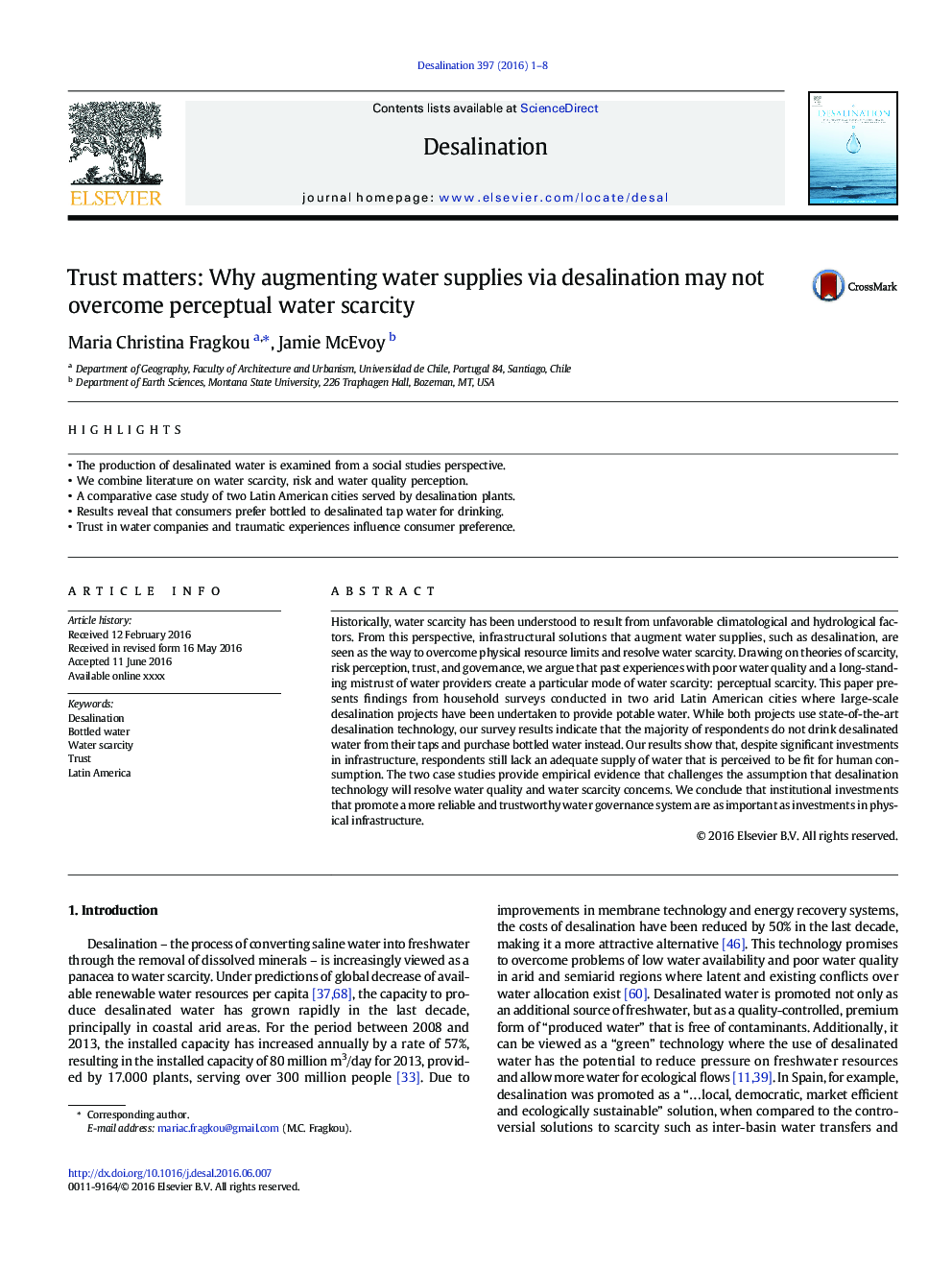| کد مقاله | کد نشریه | سال انتشار | مقاله انگلیسی | نسخه تمام متن |
|---|---|---|---|---|
| 7008182 | 1455298 | 2016 | 8 صفحه PDF | دانلود رایگان |
عنوان انگلیسی مقاله ISI
Trust matters: Why augmenting water supplies via desalination may not overcome perceptual water scarcity
ترجمه فارسی عنوان
اعتماد به مهمات: چرا افزایش منابع آب از طریق نوشیدن آب ممکن است کمبود آب تصور نکنند
دانلود مقاله + سفارش ترجمه
دانلود مقاله ISI انگلیسی
رایگان برای ایرانیان
کلمات کلیدی
نمک زدایی، آب بطری، کمبود آب، اعتماد، آمریکای لاتین،
ترجمه چکیده
از لحاظ تاریخی، کمبود آب در نتیجه فاکتورهای هواشناسی و هیدرولوژیکی ناخوشایند است. از این منظر، راه حل های زیربنایی که منابع آب را افزایش می دهند، مانند آب شیرین کن، به عنوان راهی برای غلبه بر محدودیت منابع فیزیکی و حل کمبود آب دیده می شود. ما بر این باوریم که تجارب گذشته با کمبود کیفیت آب و عدم اعتماد دیررس به تامین کنندگان آب یک حالت خاص از کمبود آب ایجاد می کند: کمبود ادراک. این مقاله، یافته های تحقیقاتی خانوار را در دو شهر خاورمیانه آمریکای لاتین ارائه می دهد که طرح های آب شیرین در مقیاس وسیع انجام شده است. در حالی که هر دو پروژه با استفاده از تکنولوژی آب شیرین کنی پیشرفته، نتایج بررسی های ما نشان می دهد که اکثر پاسخ دهندگان آب نمکی از شیپور خاموشی خود نوشیدند و به جای خرید آب بطری خریداری کردند. نتایج ما نشان می دهد که علیرغم سرمایه گذاری های قابل توجه در زیرساخت ها، پاسخ دهندگان هنوز هم از عرضه آب مناسب برخوردار نیستند که قابل قبول برای مصرف انسان است. دو مطالعه موردی شواهد تجربی را ارائه می دهد که بر این فرضیه می افزاید که فن آوری آب شیرین کن کیفیت آب و کمبود آب را حل خواهد کرد. ما نتیجه می گیریم که سرمایه گذاری های نهادی که یک سیستم حکومتی آب قابل اعتماد و قابل اعتماد را ارتقا می دهند، همانند سرمایه گذاری در زیرساخت های فیزیکی مهم است.
موضوعات مرتبط
مهندسی و علوم پایه
مهندسی شیمی
تصفیه و جداسازی
چکیده انگلیسی
Historically, water scarcity has been understood to result from unfavorable climatological and hydrological factors. From this perspective, infrastructural solutions that augment water supplies, such as desalination, are seen as the way to overcome physical resource limits and resolve water scarcity. Drawing on theories of scarcity, risk perception, trust, and governance, we argue that past experiences with poor water quality and a long-standing mistrust of water providers create a particular mode of water scarcity: perceptual scarcity. This paper presents findings from household surveys conducted in two arid Latin American cities where large-scale desalination projects have been undertaken to provide potable water. While both projects use state-of-the-art desalination technology, our survey results indicate that the majority of respondents do not drink desalinated water from their taps and purchase bottled water instead. Our results show that, despite significant investments in infrastructure, respondents still lack an adequate supply of water that is perceived to be fit for human consumption. The two case studies provide empirical evidence that challenges the assumption that desalination technology will resolve water quality and water scarcity concerns. We conclude that institutional investments that promote a more reliable and trustworthy water governance system are as important as investments in physical infrastructure.
ناشر
Database: Elsevier - ScienceDirect (ساینس دایرکت)
Journal: Desalination - Volume 397, 1 November 2016, Pages 1-8
Journal: Desalination - Volume 397, 1 November 2016, Pages 1-8
نویسندگان
Maria Christina Fragkou, Jamie McEvoy,
